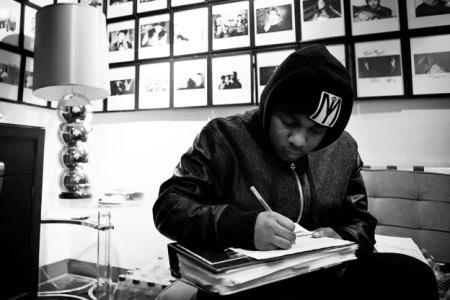
The emphasis of this module will be on writing song lyrics for performance, but it will also include writing lyrics 'for the page'. In addition to writing lyrics of their own, students will study serious lyrics in popular music, and have a chance to examine the relationship between these and other writing. Some of this will involve defining the limits, problems and advantages of writing that is designed to be heard as well as read, via recorded and published works, as well as via selected secondary reading. Students will be able to choose a writer, or writers, in this field and write an essay on their work, alongside their own lyrics towards an 'album' with a commentary on the writing process.
Negotiating the difficult balance between an academic background and contemporary culture will be discussed. An awareness of, for instance, the variability of writing about popular music, from extremes such as the fan-based to the highly sociological, is essential to a course involving practice and theory. Elements of musical setting, performance skills and techniques will not be ignored, especially in relation to the experience of hearing or reading the text. Exercises will include writing in different forms and genres and the 'workshopping' of writing in groups.
Among topics to be covered: the blues, traditional song, the ballad, comic songs, beat poetry and song, 1960s performance poets and songwriters, current performance poets, topical songs, topical and 'occasional' poems, 'light' verse, collaborative writing, writing to a tune, writing before music, using rhythm, using rhyme, poetic form, song form, the 'middle eight', the concept album.
Aims
* To study song lyrics, for performance and for 'the page' and learn from other verse forms, especially poetry for performance
* To examine the difference between texts for music and performance and other texts
* To write song lyrics in a variety of styles and for a variety of settings
* To gain greater knowledge of the skills and art of the lyricist
* To make an in-depth study of one or more lyricist/ songwriters
* To produce a portfolio and discussion of a student's own work
Learning Outcomes
1. Identify and understand the links between various types of lyric and ideas about song lyrics and how they connect with writing your own and the creative process
2. Write creative works which explore themes and styles of lyrics in different genres and modes
3. Research lyrical themes and ideas, incorporating their own research, and use them in their creative writing
4. Reflect critically on their writing in relation to other lyricists and their theories about writing
5. Understand how to use structural and thematic tropes in lyric writing in the creation of an album of songs
6. Use the critical feedback from class exercises to edit and develop their creative writing in relation to the themes of the module
Negotiating the difficult balance between an academic background and contemporary culture will be discussed. An awareness of, for instance, the variability of writing about popular music, from extremes such as the fan-based to the highly sociological, is essential to a course involving practice and theory. Elements of musical setting, performance skills and techniques will not be ignored, especially in relation to the experience of hearing or reading the text. Exercises will include writing in different forms and genres and the 'workshopping' of writing in groups.
Among topics to be covered: the blues, traditional song, the ballad, comic songs, beat poetry and song, 1960s performance poets and songwriters, current performance poets, topical songs, topical and 'occasional' poems, 'light' verse, collaborative writing, writing to a tune, writing before music, using rhythm, using rhyme, poetic form, song form, the 'middle eight', the concept album.
Aims
* To study song lyrics, for performance and for 'the page' and learn from other verse forms, especially poetry for performance
* To examine the difference between texts for music and performance and other texts
* To write song lyrics in a variety of styles and for a variety of settings
* To gain greater knowledge of the skills and art of the lyricist
* To make an in-depth study of one or more lyricist/ songwriters
* To produce a portfolio and discussion of a student's own work
Learning Outcomes
1. Identify and understand the links between various types of lyric and ideas about song lyrics and how they connect with writing your own and the creative process
2. Write creative works which explore themes and styles of lyrics in different genres and modes
3. Research lyrical themes and ideas, incorporating their own research, and use them in their creative writing
4. Reflect critically on their writing in relation to other lyricists and their theories about writing
5. Understand how to use structural and thematic tropes in lyric writing in the creation of an album of songs
6. Use the critical feedback from class exercises to edit and develop their creative writing in relation to the themes of the module